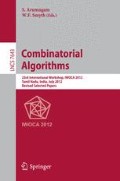Abstract
We study pattern avoidance in the context of partial words. The problem of classifying the avoidable unary patterns has been solved, so we move on to binary, ternary, and more general patterns. Our results, which are based on morphisms (iterated or not), determine all the ternary patterns’ avoidability indices or at least give bounds for them.
This material is based upon work supported by the National Science Foundation under Grant No. DMS–1060775. We thank Sean Simmons from the Massachusetts Institute of Technology for his very valuable comments and suggestions.
Access this chapter
Tax calculation will be finalised at checkout
Purchases are for personal use only
Preview
Unable to display preview. Download preview PDF.
References
Bean, D.R., Ehrenfeucht, A., McNulty, G.: Avoidable patterns in strings of symbols. Pacific Journal of Mathematics 85, 261–294 (1979)
Blanchet-Sadri, F.: Algorithmic Combinatorics on Partial Words. Chapman & Hall/CRC Press, Boca Raton, FL (2008)
Blanchet-Sadri, F., Black, K., Zemke, A.: Unary Pattern Avoidance in Partial Words Dense with Holes. In: Dediu, A.-H., Inenaga, S., Martín-Vide, C. (eds.) LATA 2011. LNCS, vol. 6638, pp. 155–166. Springer, Heidelberg (2011)
Blanchet-Sadri, F., Mercaş, R., Simmons, S., Weissenstein, E.: Avoidable binary patterns in partial words. Acta Informatica 48(1), 25–41 (2011)
Blanchet-Sadri, F., Mercaş, R., Simmons, S., Weissenstein, E.: Erratum to: Avoidable binary patterns in partial words. Acta Informatica 49, 53–54 (2012)
Cassaigne, J.: Unavoidable binary patterns. Acta Informatica 30, 385–395 (1993)
Cassaigne, J.: Motifs évitables et régularités dans les mots. PhD thesis, Paris VI (1994)
Clark, R.J.: The existence of a pattern which is 5-avoidable but 4-unavoidable. International Journal of Algebra and Computation 16, 351–367 (2006)
Lothaire, M.: Algebraic Combinatorics on Words. Cambridge University Press, Cambridge (2002)
Ochem, P.: A generator of morphisms for infinite words. RAIRO-Theoretical Informatics and Applications 40, 427–441 (2006)
Zimin, A.I.: Blocking sets of terms. Mathematics of the USSR-Sbornik 47, 353–364 (1984)
Author information
Authors and Affiliations
Editor information
Editors and Affiliations
Rights and permissions
Copyright information
© 2012 Springer-Verlag Berlin Heidelberg
About this paper
Cite this paper
Blanchet-Sadri, F., Lohr, A., Scott, S. (2012). Computing the Partial Word Avoidability Indices of Ternary Patterns. In: Arumugam, S., Smyth, W.F. (eds) Combinatorial Algorithms. IWOCA 2012. Lecture Notes in Computer Science, vol 7643. Springer, Berlin, Heidelberg. https://doi.org/10.1007/978-3-642-35926-2_23
Download citation
DOI: https://doi.org/10.1007/978-3-642-35926-2_23
Publisher Name: Springer, Berlin, Heidelberg
Print ISBN: 978-3-642-35925-5
Online ISBN: 978-3-642-35926-2
eBook Packages: Computer ScienceComputer Science (R0)

